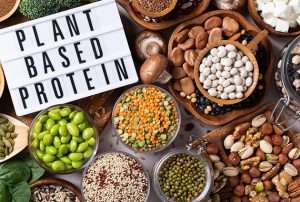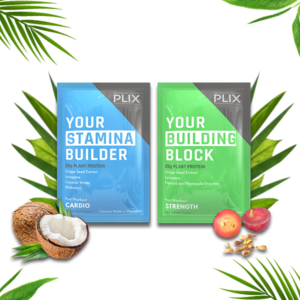How to choose the Best Plant-Based Protein Powder?

Plant-based protein powders are a potent alternative to animal-based protein powders, which are made from milk compounds. This is good news for people with food sensitivities, such as lactose intolerance, and for those who eschew animal products but don’t want to give up the muscle-building and recovery benefits, these powders offer. Protein is an essential building block for your bones, skin, muscles, and blood and is needed by your body to produce hormones and enzymes.
With a huge selection of protein powders on the market and the daunting quantities they come in, it can be difficult to figure out the right protein powder for your needs. So how to choose a protein powder best for you? Choosing the best protein supplement for your health goals means asking yourself some important questions. Do I want a complete protein? What flavour do you like best? What dosage of powder do I want to take? Do I want to take a protein isolate? What are my fitness goals? Am I looking for a gluten-free, organic, or non-GMO protein powder? If you’re vegan then you have additional criteria to consider when making your decision — is this protein powder vegan?
6 Key Things to ask when purchasing Plant-Based Protein Powder.
1. Is it a Complete Protein Powder?
One of the most important questions to ask yourself if you are looking for a vegan protein powder is whether it is a complete source of protein and how to choose a protein powder that provides a complete source of protein? Let’s break this down. A complete protein contains all nine essential amino acids, which your body cannot produce itself: histidine, isoleucine, leucine, lysine, methionine, phenylalanine, threonine, tryptophan, and valine. Your body combines these organic compounds to form the proteins needs to perform important functions such as growing and repairing muscle tissue (this is why you see so many athletes drinking post-workout protein shakes).
When choosing a protein powder, ensure that you are choosing a protein blend like Plix made from pea protein and brown rice that provides you with complete proteins. Because plant sources may not contain all nine essential amino acids, we recommend that vegans, and those that follow a dairy-free diet, choose a plant-based protein powder blend with all nine essential amino acids.
2. How many grams of Protein does it provide?
The Institute of Medicine (IOM) recommends that your individual daily protein intake should equal 0.8 grams per kilogram of your body weight. While generally, the IOM recommends that the average sedentary woman consume 46 grams per day, and the average sedentary man consumes 56 grams per day.
3. What is the Source of Protein?
A dash of a pea, a pinch of hemp. Some of the most popular options for plant proteins are soy protein, pea protein, brown rice protein, and hemp protein. You should consider these protein sources in relation to your own needs. For example, if you are trying to limit your soy intake, then you may want to choose an option made from brown rice and pea protein instead. Based on your own preference, you may also want to consider whether the source of the plant-based protein is certified organic and non-GMO.
4. What about Sugar in Protein Powders?
Sugar is added to most of our food, and vegan protein powders are no exception. Often, sugar improves the natural flavour of plant-based protein powders. While added sugar isn’t bad in small doses, it does add additional calories without any additional nutrients. The International Heart Association recommends limiting the amount of added sugars you consume to no more than half of your daily discretionary calorie allowance. For most women, this is no more than 100 calories coming from sugar per day and no more than 150 calories coming from sugar per day for men. This approximately six teaspoon of sugar per day for women and nine teaspoons per day for men.
5. What flavours of Vegan Protein are available?
Vanilla? Chocolate? Protein powders come in three common flavours: vanilla, chocolate, and unflavored. When choosing a vegan protein powder, let your taste buds have some input while keeping your health in mind. If you want a vanilla flavoured or chocolate-flavoured protein, consider looking for one without too many grams of added sugars. Naturally flavoured protein powders offer just as much flavour as artificially flavoured protein powders, which can leave an aftertaste. If you prefer a plain protein powder, you can add lots of tasty, flavoured ingredients to your protein shakes like fresh fruit or peanut butter.
6. Are there any known adverse effects of using a particular brand of Protein?
When you have narrowed down the type of plant protein that interests you, you will need to pick a brand. Do your research on the brand, the scientific research behind their claims, and their ingredient sourcing. Get to know the ingredients. You may want to consider whether the brand uses organic ingredients or other variables that will give you a fuller picture of what you’ll be consuming. Look for signs of that the brand is trustworthy and has done their research — like if they work with medical professionals to create products with the consumer in mind and the company and their partners have proper accreditation. Most importantly, choose a brand that you trust and feel has your best interest at heart.

You can also buy our Plant-based protein powder from Amazon here:















